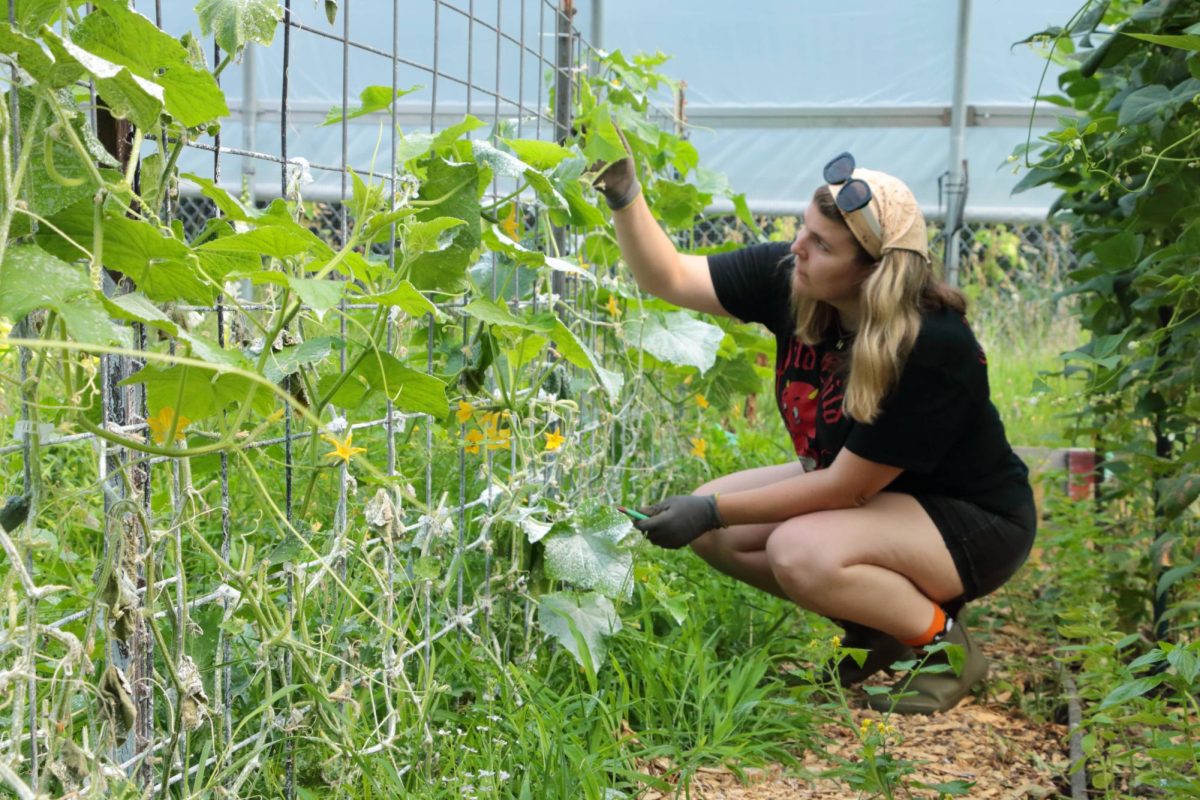Nearing its 15th anniversary, Oakland University’s Campus Student Organic Farm (CSOF) is in full swing this summer. The farm continues to nurture sustainable agriculture education while also providing students and community members with opportunities to get involved. Tours and programs abound, and the farm welcomes volunteer help from students, clubs and local residents alike.
The farm’s current operations are a major aspect of the efforts of OU-LORACS, the Laboratory for Outdoor Research, Agriculture, Conservation and Sustainability, which provides support for ecological research and educational opportunities within the OU community.
“With the designation of LORACS, just recently, community engagement is a priority, and it’s big,” Faye Hansen, Ph.D., associate professor in the Department of Biological Sciences, founder and director of the CSOF, said.
“Clubs, different groups and classes like to come out for a day. All summer long, Fridays are volunteer days from 10 a.m.-2 p.m., and people can just drop by. I also have volunteer hours on the weekends, 3:30-5 p.m. on Sundays,” Hansen said. “We’re having three other camps here with the OUCARES program, something I’ve looked forward to having a partnership with for a long time.”
Summer volunteers can expect a variety of hands-on tasks, from weeding and harvesting to personal public interfacing and even assistance through artistic endeavors. Hansen encourages community members with unique skill sets to participate and implement their abilities for the benefit of the farm and the community as a whole.
“We have one volunteer from the community that comes every Friday, and she’s a joy because she’s also an artist. She’s painting some new Farm Stand signs for us,” Hansen said. “Maybe you don’t like to weed, but, man, we could use some more signs painted.”
The farm is also supported by a dedicated group of students who take their participation further, becoming CSOF staff. While assisting with each stage of the farm’s growing cycle each summer, Hansen said that student staff develop professional skills and leadership experience along the way.
“Being on the student crew is a really great experience because you learn even more,” Hansen said. “You come away with four main things employers in every field are looking for: the ability to show leadership, communicate across disciplines, integrate knowledge from different areas and solve problems creatively.”
Among the farm’s most popular produce offerings are the Personal Summer Farm and Flower Shares programs. Subscribers receive a half bushel of fresh vegetables or a seasonal bouquet, with partial or full season optionality, though the full season option sold out well ahead of its start in May of this year.
“We always have a waiting list [for the full season option],” Hansen said. “This year we even started a new four-week very late season that goes into the fall with squash and things that aren’t quite ready for harvest – things you might want to prepare for Thanksgiving or fall soups and such.”
As the farm continues growing into the fall, students and staff operate an on-campus Farm Stand from September through mid-October.
“Lots of crops until then,” Hansen said. “With the hoop house, we can keep harvesting a lot of our leafy greens in time for our November produce and bake sale.”
As Hansen continues to manage the farm’s operations with coordinated efforts from students, staff and volunteers, she also participates in outreach events to promote agricultural interaction, such as leading a Teaching Talk for the Center for Excellence in Teaching and Learning (CETL).
“In the fall, through the CETL, I’m giving a workshop about how classes can be involved with the farm in different ways,” Hansen said.
In fact, the farm has collaborated with capstone classes, illustrating the bond between education and hands-on experience.
“We’ve even had a few interesting projects with engineering capstone classes. In the most recent one, we helped to test out a solar-powered garden cart that was meant to be a prototype of something that could be used in Africa,” she said. “You never know. There are so many ways that classes or special projects can be accommodated here with the farms.”
For students and community members looking for ways to get involved and connect through agricultural means, the Campus Student Organic Farm remains a welcoming place for hands-on education, participation and collaboration.
“2010 was our first farm year,” Hansen said. “15 years – it’s like it flies by.”








